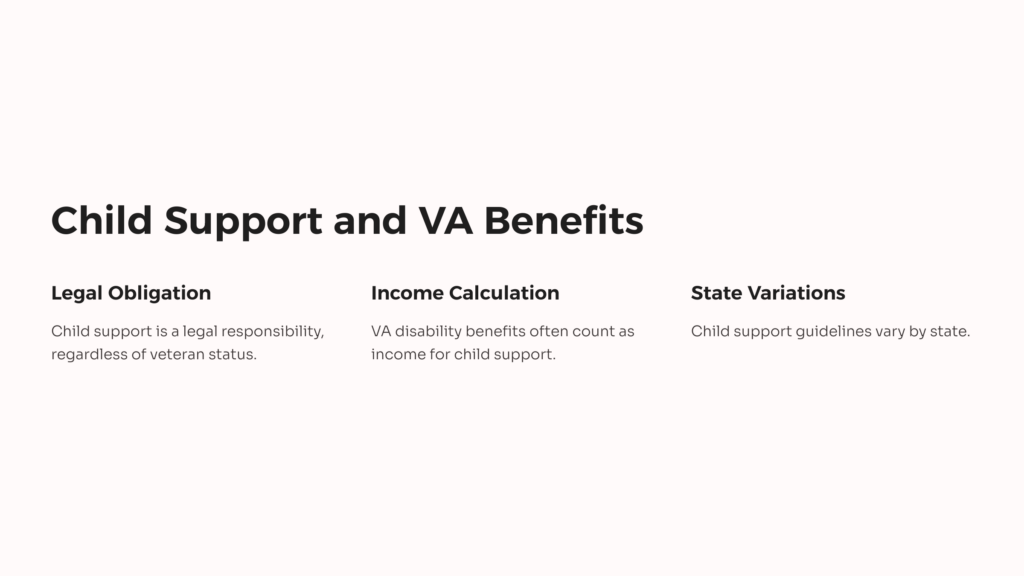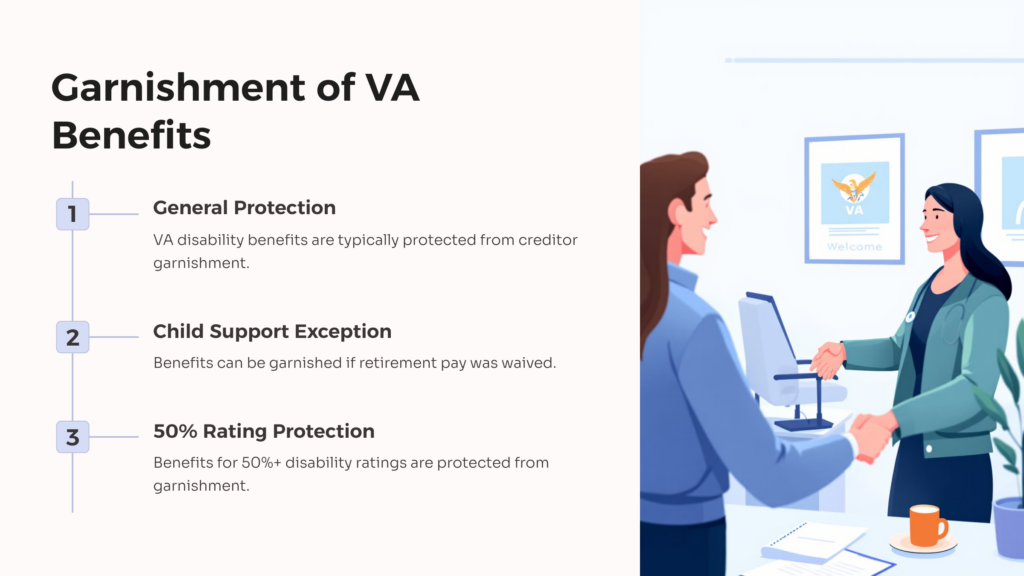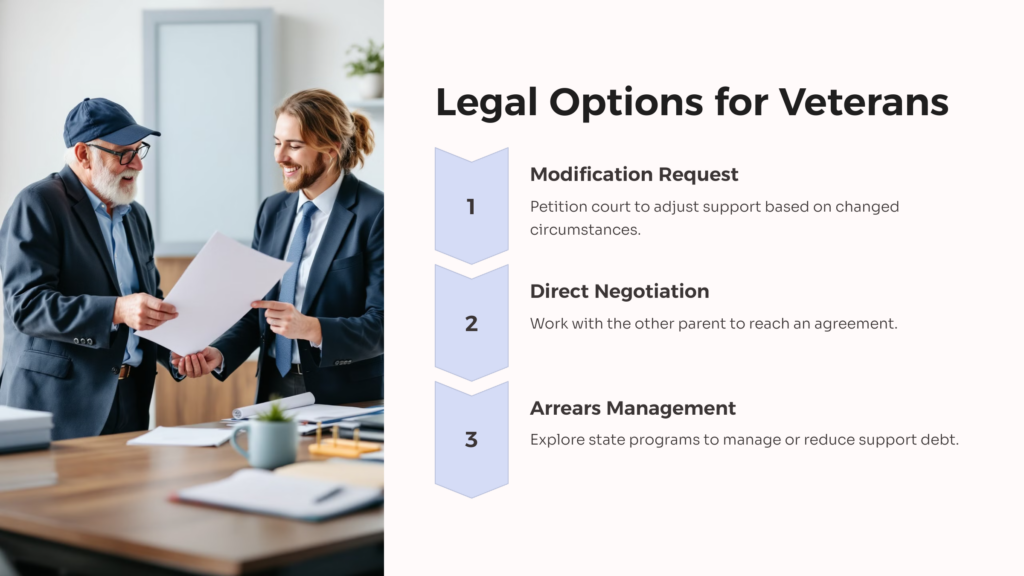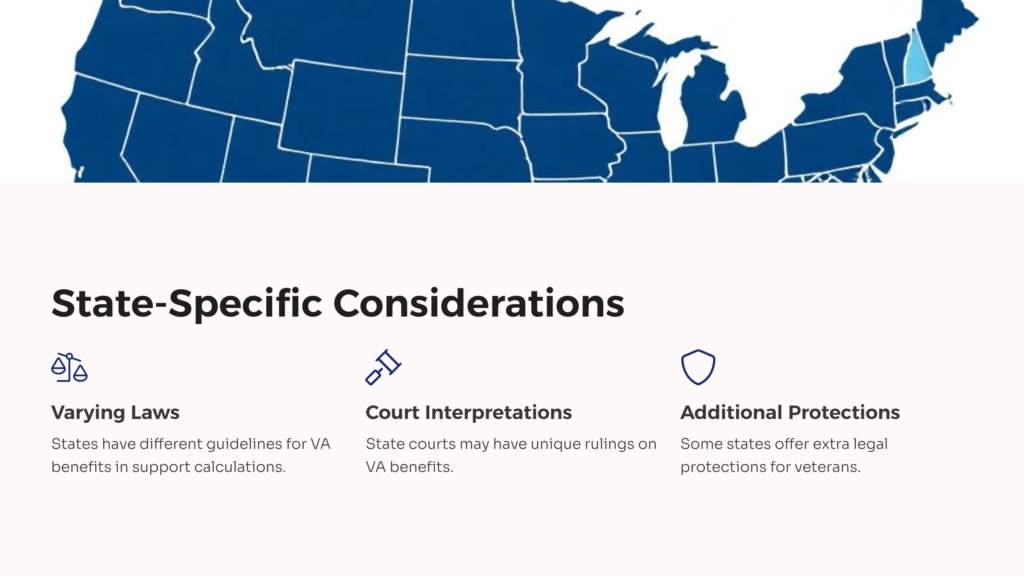VA disability benefits provide monthly payments to veterans with service-connected disabilities—conditions caused or worsened by their military service. The amount is based on a disability rating from 0% to 100%, and because these payments are tax-free, veterans keep the full amount to help cover living expenses and medical needs. For many, this support is essential, especially when a disability impacts their ability to work. Veterans with dependents, like a spouse or children, may also qualify for additional compensation to help support their families. But when it comes to whether VA disability benefits can be used for child support, the answer isn’t simple and requires a closer look.
The Legal Framework for Child Support

Child support is a legal obligation for parents to provide financial support for their children. This responsibility doesn’t change just because a parent is a veteran or receives VA disability benefits. The goal of child support is to ensure that children have their basic needs met, including food, shelter, clothing, and education.
Each state has its own guidelines for calculating child support, but they generally consider the income of both parents, the number of children, and the amount of time each parent spends with the children. Some states also take into account special needs or extraordinary expenses.
For veterans, the question often arises: does VA disability count as income for child support calculations? The answer is yes, in most cases. Courts typically consider all sources of income when determining child support obligations, including VA disability benefits.
Can VA Disability Be Garnished for Child Support?

The short answer is: it depends. Generally, VA disability benefits are protected from garnishment by creditors. However, child support is a special case. Under certain circumstances, these benefits can be garnished to pay child support.
According to federal law, VA disability compensation can be garnished for child support if the veteran waived a portion of their military retirement pay to receive VA disability compensation. This is often referred to as a “VA waiver.”
It’s important to understand that this doesn’t mean all VA disability benefits can be automatically garnished. The law sets specific limits and conditions that must be met before garnishment can occur. For many veterans, especially those who did not waive retirement pay, their VA disability benefits remain protected from garnishment.
Exceptions to the Garnishment Rule
While the general rule allows for garnishment of VA disability benefits in certain cases, there are important exceptions to be aware of. These exceptions provide additional protections for veterans and their benefits.
One key exception is for veterans who receive disability benefits due to a service-connected disability rating of 50% or higher. In these cases, the VA benefits cannot be garnished for child support, even if the veteran waived retirement pay to receive them.
Another exception applies to veterans who receive non-service-connected pension benefits. These benefits are typically awarded to low-income veterans who are permanently and totally disabled. These pension benefits are generally protected from garnishment for child support.
It’s crucial for veterans to understand these exceptions and how they might apply to their specific situation. Consulting with a legal professional who specializes in veterans’ benefits and family law can provide clarity and guidance.
The Role of Apportionment in Child Support
Apportionment is an alternative to garnishment that can be used to provide child support from VA disability benefits. This process is handled directly by the VA, rather than through the court system.
With apportionment, a portion of the veteran’s benefits can be paid directly to the child or the child’s caregiver. This can be requested by filling out VA Form 21-0788, which is the Application for Apportionment of Beneficiary’s Award.
The VA considers several factors when deciding on an apportionment request:
- The financial needs of the child
- The financial capability of the veteran
- Any special needs or hardships involved
Apportionment can be a less adversarial approach than garnishment, as it allows for some flexibility and consideration of the veteran’s circumstances. However, it’s important to note that the VA will not approve an apportionment if it would cause undue financial hardship to the veteran.
How Courts Calculate Child Support with VA Benefits
When calculating child support, courts typically consider all sources of income, including VA disability benefits. However, the way these benefits are factored in can vary by state and individual circumstances.
In most cases, VA disability benefits are counted as income for the purpose of determining child support obligations. This means they’re added to any other income the veteran may have when calculating the total amount available for support.
Some key points to remember:
- Courts look at the total amount of benefits received, not just the portion related to dependent children
- The tax-free nature of VA disability benefits may be taken into account
- Some states may have specific rules about how VA benefits are considered in child support calculations
It’s important for veterans to provide accurate information about their VA benefits and other income sources when involved in child support proceedings. This ensures that the court can make a fair and accurate determination of support obligations.
Legal Options for Veterans Facing Child Support Claims

Veterans who are facing child support claims have several legal options available to them. It’s crucial to understand these options and seek appropriate legal advice to protect your rights and ensure fair treatment.
One option is to request a modification of the child support order. If a veteran’s financial circumstances have changed significantly, such as a reduction in income or an increase in disability-related expenses, they can petition the court to adjust the support amount. This process typically involves demonstrating the change in circumstances and how it affects the ability to pay.
Another option is to negotiate directly with the other parent to reach a mutually agreeable support arrangement. This can be done through mediation or with the help of attorneys. Such agreements still need to be approved by the court to be legally binding.
For veterans struggling with existing child support debt, some states offer programs to help manage or reduce arrears. These might include debt compromise programs or payment plans. It’s important to address any arrears promptly to avoid more serious consequences like driver’s license suspension or other penalties.
Impact of VA Disability Rating on Child Support
A veteran’s VA disability rating can have a significant impact on child support considerations. The higher the disability rating, the more protection the veteran’s benefits may have from garnishment.
For veterans with a disability rating of 50% or higher, their VA disability compensation is generally protected from garnishment for child support. However, this doesn’t mean they’re exempt from child support obligations altogether. The court will still consider these benefits as income when calculating support amounts.
Veterans with lower disability ratings may have less protection from garnishment. However, courts and the VA will still consider the veteran’s ability to pay and ensure that garnishment doesn’t cause undue hardship.
It’s also worth noting that a change in disability rating can be grounds for requesting a modification of child support orders. If a veteran’s rating increases or decreases significantly, it may be appropriate to revisit the support arrangement.
State-Specific Laws and Variances

While federal law provides the overarching framework for how VA disability benefits can be used for child support, individual states may have additional laws or interpretations that affect these cases. It’s crucial for veterans to understand both federal and state laws that may apply to their situation.
For example, some states may have specific guidelines about how VA disability benefits are factored into child support calculations. Others may have different thresholds for when garnishment can occur or how much can be garnished.
Here are a few state-specific considerations:
- In Texas, VA disability benefits are generally considered income for child support purposes, but there may be limitations on garnishment.
- California courts have held that VA disability benefits can be considered for child support, even if they can’t be directly garnished.
- Some states have laws that provide additional protections for veterans in legal proceedings, including child support cases.
Given these variations, it’s crucial for veterans to consult with a legal professional familiar with both veterans’ benefits and family law in their specific state. This can help ensure that their rights are protected and that state-specific nuances are properly addressed.
Steps to Take if Facing Garnishment
If you’re a veteran facing the possibility of garnishment of your VA disability benefits for child support, there are several steps you should take:
1. Verify the legality: Ensure that the garnishment order is legal under federal law. Remember, only benefits received in place of waived retirement pay can typically be garnished.
2. Review your disability rating: If your rating is 50% or higher, your benefits may be protected from garnishment.
3. Gather documentation: Collect all relevant financial documents, including information about your VA benefits, other income sources, and expenses.
4. Seek legal advice: Consult with an attorney who specializes in veterans’ benefits and family law. They can help you understand your rights and options.
5. Consider negotiation: You may be able to negotiate a payment plan or modified support arrangement that doesn’t involve garnishment.
6. Explore apportionment: As an alternative to garnishment, you might consider requesting apportionment through the VA.
7. Request a hearing: If you believe the garnishment is improper or would cause undue hardship, you can request a hearing to present your case.
Remember, taking prompt action is crucial. Ignoring garnishment orders or child support obligations can lead to serious consequences.
How to Apply for Apportionment
Apportionment can be a useful alternative to garnishment for providing child support from VA disability benefits. Here’s how to apply:
1. Obtain the correct form: You’ll need to fill out VA Form 21-0788, Application for Apportionment of Beneficiary’s Award.
2. Gather necessary information: You’ll need details about the veteran’s VA claim number, the child’s information, and financial information for both the veteran and the child.
3. Complete the form: Answer all questions thoroughly and accurately. Provide as much detail as possible about the financial needs of the child and the veteran’s ability to pay.
4. Submit supporting documents: Include any relevant documentation, such as birth certificates, custody agreements, or financial statements.
5. Submit the form: Send the completed form and supporting documents to the VA regional office that handles the veteran’s claim.
6. Wait for a decision: The VA will review the application and make a decision. This process can take several months.
7. Respond to any requests: The VA may ask for additional information. Respond promptly to avoid delays.
Remember, the VA will consider the needs of both the child and the veteran when making a decision. They aim to ensure that apportionment doesn’t cause undue hardship to the veteran while still providing for the child’s needs.
Resources for Legal Assistance
Navigating the intersection of VA disability benefits and child support can be complex. Fortunately, there are resources available to help veterans understand their rights and obligations:
1. Veterans Benefits Administration: Offers information about VA benefits and can provide guidance on apportionment.
2. Stateside Legal: Provides legal information and resources specifically for veterans, service members, and their families.
3. American Bar Association’s Military Pro Bono Project: Connects active-duty military personnel to free legal assistance for civil legal issues.
4. Local Veterans Service Organizations (VSOs): Many VSOs have service officers who can provide guidance on benefits issues.
5. Legal Aid organizations: Many offer free or low-cost legal services to veterans, especially for family law matters.
6. Law school clinics: Some law schools have clinics that provide free legal assistance to veterans.
7. State bar associations: Often have referral services to connect veterans with attorneys experienced in military and veterans’ issues.
Remember, while these resources can provide valuable information and assistance, it’s often beneficial to consult with an attorney who specializes in both veterans’ benefits and family law for personalized advice about your specific situation.
Balancing Benefits and Responsibilities
VA disability benefits are a vital source of support for many veterans, but they don’t erase the responsibility to provide for your children. Understanding how these benefits interact with child support laws—at both the federal and state level—can help you protect your rights while meeting your obligations. Whether you’re facing garnishment, considering apportionment, or seeking a child support modification, taking informed action is key. The rules can be complex, but with the right legal guidance, you can navigate them successfully. Your benefits are meant to support you, but your role as a parent is just as important—striking that balance ensures both you and your children can move forward securely.
 AllVeteran.com Advisors
AllVeteran.com Advisors
With expertise spanning local, state, and federal benefit programs, our team is dedicated to guiding individuals towards the perfect program tailored to their unique circumstances.


















